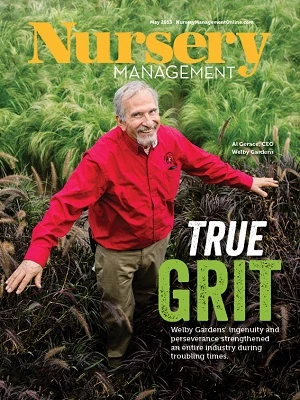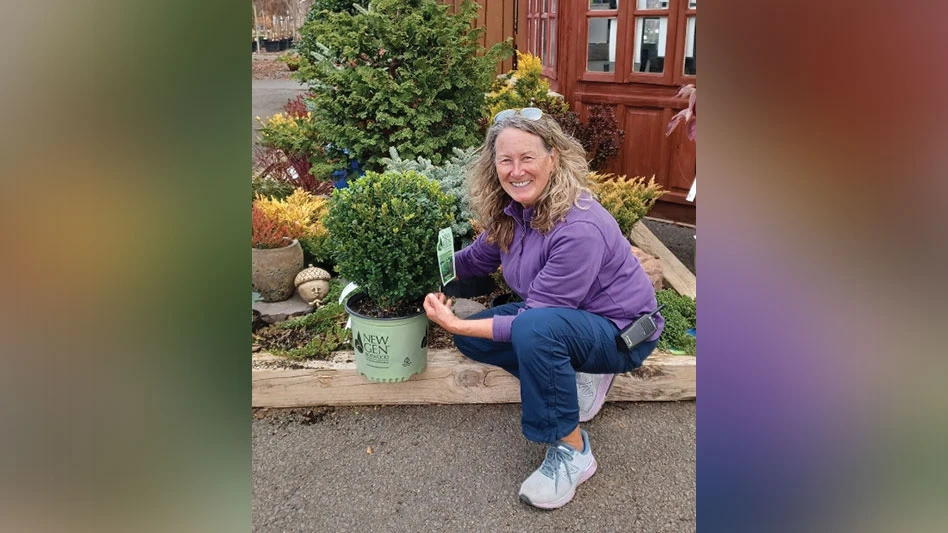
 Al Gerace, CEO of Welby Gardens in Denver, Colo., belongs to the second generation in this four-generation operation. Gerace was a pioneer in the industry when he launched the Hardy Boy Plant brand in 1976. Today, the brand appears in independent garden centers in several states. Photos by Matt Nager |
When Welby Gardens faced an event that easily could have devastated its business, the family operation acted with fortitude and created a solution that ultimately bolstered its sales.
It was the mid-1970s and Colorado was in the throes of a major drought. Authorities were implementing stringent water restrictions. Instead of simply giving in, the Gerace family looked for the proverbial silver lining.
“It was necessary for us to promote plants and defend against the water restrictions,” said Al Gerace, CEO of Welby Gardens. “We had a product that was hardier than most other offerings on the market, and we had to show the consumer how they could have a better degree of success when they planted our product.”
The Denver-based grower needed a marketing strategy to convince consumers that it had a superior product and encourage them to keep planting, even during a drought.
“I had an idea of what I wanted to do for a logo,” Gerace said.
He drew a letter K askew, making the lines of the letter into arms and legs. He added a circle for a head and created the Hardy Boy symbol and brand.
“My train of thought was: we start with young plants and make them durable, which grow to beautiful plants. And, since I had a son at the time, I thought of how a boy grows into a man. With that, Hardy Boy Plants was born,” he recalled.
|
All in the family There are four generations working at Welby Gardens in Denver, Colo. CEO Al Gerace belongs to the second generation along with his brothers Carmen and John. The second generation is still active in the business, but much of the transfer of authority has been made to the third generation — Mark, Marty, John Jr. and Dan Gerace, and Giovanna Romero and Mandy Foster. And Candy Gerace, who’s married to Marty, runs the retail division. The transition of ownership to the third generation is a work in progress, Al said. Marty’s son, Nick, is the first member of the fourth generation to join the family business. And Mark has two daughters that work in the greenhouse when they’re not in school. But don’t look for Al to retire soon. “I always said I could never retire before my mom. She just retired a year and a half ago and she’s 93,” he said with chuckle. Besides the competition with his mom, Al isn’t ready to leave such a dynamic workplace or the work he’s known his entire life. “The whole process of growing is a way of life. The family operation is a commitment,” he said. “To grow a business like this and to grow a family like we’ve done, well, it’s just special. There’s a certain therapy to all of it.” |
And in 1976, one of the first plant brands debuted at independent garden centers throughout Colorado and the surrounding states.
“It was a way to promote our plants so we could advertise ourselves and our independent garden center customers to the public,” Gerace said.
|
Welby Gardens Founded: In Denver, Colo., in 1948 by Alex and Esther Gerace for vegetable production. The company started growing geraniums in 1955. |
The “hardy” in Hardy Boy Plants stems from a production method the grower implemented to harden up the plants before they left the greenhouse. After all, the plants had to withstand Colorado’s poor soils, low rainfall (including drought conditions) and extreme temperatures in summer and winter. Welby Gardens adds minerals (potassium, nitrogen and phosphorous) to its water, grows dry, and for certain crops, grows cool. All finished plants go through the water stress treatment, but the cool treatment applies to appropriate species such as pansies, violas, dusty miller, dianthus, petunias, alyssum, verbena and nearly all perennials, Gerace said. Heat-loving plants, like impatiens, coleus, vinca, zinnia or marigolds, are not subjected to the cold treatment, he said.
For the first eight or 10 years after introducing the brand, the grower simply tagged plants with the Hardy Boy tag. But by the late 1980s, Welby Gardens was ready to take the next step with its brand. That’s when the grower began cooperative advertising with retail accounts — something it still does today. The Hardy Boy cooperative program was launched in other markets, not just in Denver or along the Front Range. The brand appeared in cities such as San Antonio, Texas, and Santa Fe, N.M.
“With cooperative advertising, we’re not only partnering with retailers to market our plants, but it’s a way to expand the market for everyone,” Gerace said.
Today the Hardy Boy marketing campaign includes print media, television and social media. Point-of-purchase material includes large all-weather banners and vertical signage for posts or end caps. Most Hardy Boy plants are grown in red pots, including red packs. Welby Gardens grows annuals, perennials, ornamental grasses, herbs and vegetables. The company has three divisions — wholesale, retail and young plants.
Another drought, another solution
In a déjà vu moment, Colorado was suffering from the worst drought in its history in 2002 and 2003. Experts classified it as a 700-year drought. Municipalities were instituting the toughest water restrictions to date. The green industry stood to lose millions in revenue.
“Drought is our biggest challenge above anything else, especially the politics that go along with a drought,” Gerace said.
 And just as the company did in 1976, instead of surrendering to the politics, Welby Gardens armed itself and its customers with powerful educational tools.
And just as the company did in 1976, instead of surrendering to the politics, Welby Gardens armed itself and its customers with powerful educational tools.
“We put together conferences for park departments and municipalities, where we discussed things like planting options and drip irrigation,” Gerace said. “We also educated the area water boards.”
Welby Gardens’ biggest message was, “don’t panic and don’t give up,” he said.
“It was critical to influence the can-do message of gardening. We couldn’t let consumers think they had to stop gardening because of the water restrictions.”
Also in 2003, Welby Gardens began a drought trialing program. The company trialed water stress on several types of landscape plants. From its data, Welby Gardens was able to provide retailers, landscape contractors and consumers an idea of exactly what water levels were needed for particular plants.
From that research, Gerace and his team helped create the X-Rated Xeriscape Gardening program. Plants in the program are rated by their evapotranspiration (ET) rates. An X-Rated plant has an ET rate of .5, which translates to about 1 inch of water. A plant in the XX-Rated category has an ET rate of .25, or ½-inch of water per week. The final and most drought-tolerant category, the XXX-Rated plants, have a .125 ET, about ½-inch of water every two weeks.
“This rating system allows consumers to see that they can garden and have a beautiful landscape, even during some of the worst conditions,” Gerace said.
|
The retail looking glass Welby Gardens’ first retail operation opened in 1972. The company soon learned it could experiment with pricing and package design at its own store. “It allowed us to become price leaders,” Gerace said. “We raised our prices because we knew people would pay more for a better plant.” It also provided the company with the ability to gauge new items and get a clearer picture of where the market was going. “It also gives us common ground with our independent garden center customers,” he said. |
Some of the perennials in the X-Rated category include Aquilegia spp., Campanula spp. and Ajuga spp. XX-Rated perennials include Kniphofia spp., Rudbeckia spp., Sedum spp., Phlomis spp. and Veronica spp. The big daddies of the list, the XXX-Rated perennial choices, include Zinnia grandiflora, Sempervivum spp., Linum perenne, Euphorbia polychroma and Asclepias tuberosa.
 Welby Gardens adds minerals to the growing media to combat the poor soil conditions of Colorado landscapes. Plants are acclimated in the greenhouse to be hardier and adapt to tough climates, contributing to the gardener’s success. |
Find a comprehensive list of perennials and annuals at www.gardencentersofcolorado.org/smartgardening.
To date, Colorado was going into this spring in a drought and experts are forecasting a “pretty hot summer,” he said. Gerace is ramping up his education programs to begin the process again.
Gerace’s fortitude has kept people planting, even during a severe drought, and helped save many Colorado green-industry businesses.
For more: www.hardyboyplant.com

Explore the May 2013 Issue
Check out more from this issue and find your next story to read.
Latest from Nursery Management
- The Growth Industry Episode 3: Across the Pond with Neville Stein
- What's in a name?
- How impending tariffs and USDA layoffs impact the horticulture industry
- Shifting the urban environment
- These companies are utilizing plastic alternatives to reduce horticultural waste
- How to create a sustainable plant nursery
- Lamiastrum galeobdolon ‘Herman’s Pride’
- One of rarest plants on earth: Tahina spectabilis






